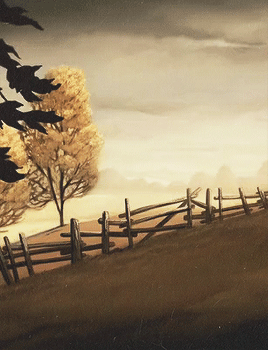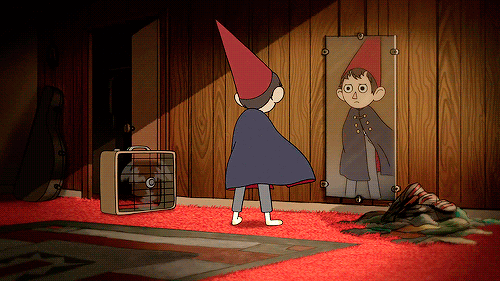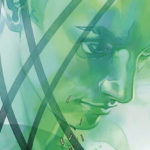
It has been almost three years, now, since I first watched Over the Garden Wall.
It was late fall — one of those crisp and blustery Novembers, wrapped in scarves and living off strong, hot tea — and I was buried chin-deep in research for the thesis I was writing at the time. Looking for something to use as a quick break in between writing sessions, my girlfriend suggested that we check out a show she’d heard was good: Over the Garden Wall.
I don’t remember, anymore, what I expected at being told we were going to watch a Cartoon Network show with Elijah Wood in it, but whatever I expected, it wasn’t what I got. Because Over the Garden Wall ended up being so much more than just a fun cartoon show to watch — it became a meditation, for me, on everything I loved about autumn, and about why the end of October is my favorite time of year.
It’s the perfect Halloween show, even three years later: there are skeletons with pumpkin heads, horrifying spectral monsters that eat children, dark and dangerous beasts, and evil witches who live in the pasture. The Unknown, the otherworldly setting for most of the show, is in a perpetual state of late autumn on the cusp of turning into winter, and despite the weeks or months in which the show takes place, it very technically all takes place on Halloween.

But it’s not the setting that makes Over the Garden Wall the perfect show for Halloween. Instead, it is the way it treats its central themes: the show is a journey with no destination except for a vague and far-off home that proves elusive at every turn. It is a critical examination of family and of loss, of the lengths to which we go to save the things we love, and what happens when those lengths prove more troublesome than they’re worth.
Over the Garden Wall is a show about many things, foremost among them death and fear and loneliness and regret. And yet, it is a show that is never for a second dark in the way that every gritty reboot or cyberpunk sequel wants to be; it is never a show that tries to depress you or scare you or make you question the worth of humanity.
It is, instead, a show that takes death and fear as truisms of life and meets them head-on, with childlike wonder.
 Sure, it’s a show filled with spirit-possessed ghouls, trees that bleed oil, and antlered many-faced monsters. Sure, it is quite literally a show about two brothers journeying through a haunted limbo-world filled with soul-stealing beasts in the midst of their own near-death experience. And yet, it isn’t scary. It isn’t horror. Instead, its existence in that twilit region imbue it with the soft late-autumn feeling you get when you watch an orange leaf fall from a tree and remember, for a moment, that the leaf has died, and that, come spring, a new one will grow in its place.
Sure, it’s a show filled with spirit-possessed ghouls, trees that bleed oil, and antlered many-faced monsters. Sure, it is quite literally a show about two brothers journeying through a haunted limbo-world filled with soul-stealing beasts in the midst of their own near-death experience. And yet, it isn’t scary. It isn’t horror. Instead, its existence in that twilit region imbue it with the soft late-autumn feeling you get when you watch an orange leaf fall from a tree and remember, for a moment, that the leaf has died, and that, come spring, a new one will grow in its place.
Over the Garden Wall is a story about the liminality of fall and the comfort that can be found as we shutter our windows to the cold and prepare ourselves for winter.
This is largely thanks to Greg, the younger of the two sibling-protagonists, an optimistic boy who accepts everything at face value in the way only a child can. Every one of Wirt’s poetic lamentations, every one of the Woodsman’s dire warnings, every moment of terror, is punctuated by one of Greg’s signature Rock Facts, or a new name for his frog, or an innocent but hilarious misreading of the situation.
He is the definition of hopeful naiveté, but his wonder is never a cruel punchline, his innocence never a weapon to tell the viewer to grow up. He is the heart of the show, running headlong into places empty and desolate and filling them with awe.
Over the Garden Wall is a world of delightful anachronism, a world which perfectly represents the cyclical nature of the changing of the seasons precisely because the Unknown remains unchanged across time, always present and taking on features of the times through which it has lived. It is a world in which the Georgian and Rococo can coexist seamlessly, where the contemporary can be mistaken for the Victorian, where the dead dance in a town simultaneously Colonial and entirely out of time.
Time doesn’t matter in the Unknown, perched precariously and permanently at the cusp between seasons, yet existing in every year at which those seasons move from one to the next.
In fact, it isn’t until episode seven that the viewer knows how old Wirt is (“I’m in, like, high school,” he replies when another character refers to him and Greg as children), and not until the penultimate episode when it is revealed that their strange outfits (pointed red hat and cape for Wirt and green lederhosen and a tea-kettle-hat for Greg) aren’t the product of a strange origin lost to time, or their rooting in some strange fantasy world, but in fact just the cobbled together Halloween costumes of two twenty-first century kids.

Death lies at the periphery of every interaction the boys have in their time in the Unknown, whether lurking around corners and behind trees in the form of the Beast, or meeting them head-on in a village of skeletons. Loss trails the Woodsman around like a dog at his heels as he works in resigned perpetuity chopping down Edelwood trees to feed the lantern in which the soul of his daughter resides.
But Over the Garden Wall doesn’t fear death; instead, it knows that death is another inevitable component of life, and that those who live in fear of loss, those held captive by regret for the things they once held dear, miss out on life without noticing as it passes them by.
In a since-deleted post on creator Patrick McHale’s tumblr, one user asked him if the events of Wirt and Greg’s adventure in the Unknown and the people they met them were real, whether they were part of a different reality or something else altogether. McHale’s answer illustrates that the answer to that question doesn’t matter:
The ambiguousness of the series is not hiding its truth. The ambiguousness is the truth itself.
What mysteries lurk beyond that which our biology can perceive and comprehend? And what sorts of lies and avatars does our mind use to make sense of the unknown and unknowable? When truly gazing at the ungazable [sic], what does one see?
Is there an afterlife? Are people really abducted by aliens? Do people see ghosts? Do people meet each other in dreams? What was that shadow you saw out of the corner of your eye? Was the man at the bar wearing a yellow shirt or was it a pink shirt? Can you remember? Does the truth matter?
Maybe life is more about perception that it is about truth.
(for better, or for worse)
So… I don’t know how true Wirt and Greg’s experiences were, but i [sic] can say that their experiences were at least as false as the memories we have of our own lives.
Over the Garden Wall isn’t about what’s real and what isn’t; it’s about what we make of the things we experience, and the impact they have on us, regardless of their veracity. And the melancholy and absurdity of the show, in perfect harmony, work together to make the viewer ponder this question exactly. What comes after death? What do our experiences mean if we can’t prove they really happened?
It turns out, the answer is all in the story to be told.
Clocking in at a little under two hours total, Over the Garden Wall’s ten episodes are a perfect watch (or re-watch) for this Halloween. Or, if you’re finished with that and want something even more Halloween-y, check out creator Patrick McHale’s delightfully spooky hand-drawn music video for C. W. Stoneking’s “Zombie.” You might just find the perfect new jam to play at your Halloween party tonight.



